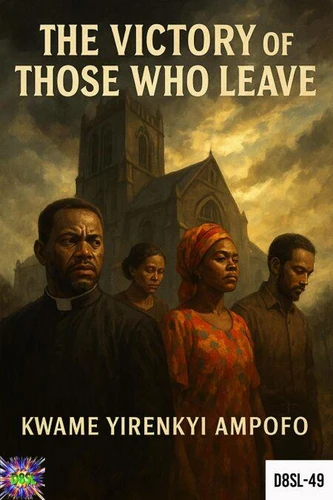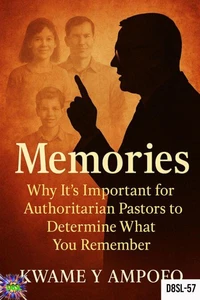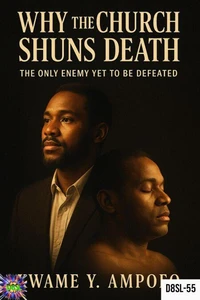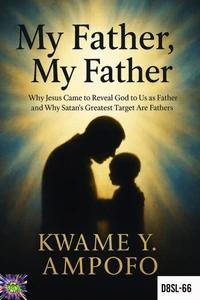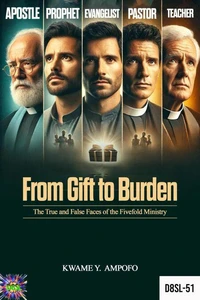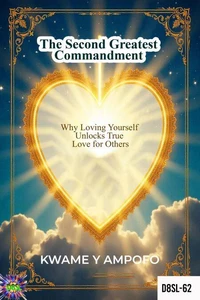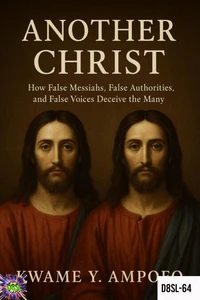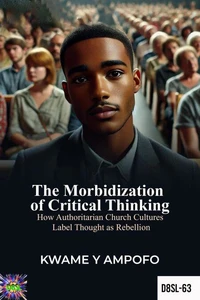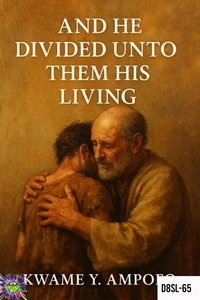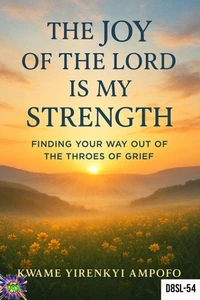The Victory of Those Who Leave. December 8 Spiritual Liberation Series
Par : ,Formats :
Disponible dans votre compte client Decitre ou Furet du Nord dès validation de votre commande. Le format ePub est :
- Compatible avec une lecture sur My Vivlio (smartphone, tablette, ordinateur)
- Compatible avec une lecture sur liseuses Vivlio
- Pour les liseuses autres que Vivlio, vous devez utiliser le logiciel Adobe Digital Edition. Non compatible avec la lecture sur les liseuses Kindle, Remarkable et Sony
 , qui est-ce ?
, qui est-ce ?Notre partenaire de plateforme de lecture numérique où vous retrouverez l'ensemble de vos ebooks gratuitement
Pour en savoir plus sur nos ebooks, consultez notre aide en ligne ici
- FormatePub
- ISBN8231466856
- EAN9798231466856
- Date de parution09/05/2025
- Protection num.pas de protection
- Infos supplémentairesepub
- ÉditeurWalzone Press
Résumé
The Victory of Those Who Leave by Kwame Y. Ampofo is a moving collection of fictionalized but deeply authentic stories of people who found freedom, healing, and spiritual clarity after leaving oppressive religious systems. These are not tales of rebellion but of resurrection-of individuals who endured manipulation, guilt, emotional control, and spiritual abuse under the guise of loyalty and faithfulness to charismatic leaders. The book opens by dedicating the work to Bernard Arde Acquah, whose courageous exit from such a system decades ago inspired many.
Through eight gripping chapters, the book tells the stories of four central characters: . Abena, a pastor's wife, suffered quietly under emotional neglect and spiritual silencing until her daughter's suicide attempt jolted her into action. Leaving her marriage, she rediscovered her voice and launched a foundation for women recovering from religious abuse. . Kwesi and Mansa, a couple once hailed for their missionary zeal, gave up their secure life in London to serve in Gabon, only to face neglect, poverty, and humiliation.
Their eventual exit restored not just their marriage, but their faith, their family, and their identity. . Mirembe and Caiphas, a ministry couple, were persecuted not for failure but for being too fruitful outside the institutional structure. Their rural evangelism efforts were seen as threatening, prompting their graceful exit and the birth of an independent mission network across West Africa. . Jonas, a prophetic pastor and brother-in-law to the powerful Apostle Saul, was gradually erased from his own ministry despite his faithfulness.
After years of silence and loyalty, he finally broke free and built a thriving church based on freedom and healing. Each story is followed by reflections that unveil the psychological and spiritual effects of long-term religious control: internalized fear, spiritual trauma, identity loss, and the slow death of joy. Yet, the overarching message is redemptive-freedom may be costly, but it is worth it. The final chapters provide deep insights into the mental warfare of leaving, the slow process of healing, and the rediscovery of a God who was never part of the manipulation.
The book ends with an epilogue titled When You're Ready, offering comfort to those who haven't yet left but are contemplating freedom. The central theme? You are not cursed for leaving. You are blessed for surviving. And even more blessed for beginning again.
Through eight gripping chapters, the book tells the stories of four central characters: . Abena, a pastor's wife, suffered quietly under emotional neglect and spiritual silencing until her daughter's suicide attempt jolted her into action. Leaving her marriage, she rediscovered her voice and launched a foundation for women recovering from religious abuse. . Kwesi and Mansa, a couple once hailed for their missionary zeal, gave up their secure life in London to serve in Gabon, only to face neglect, poverty, and humiliation.
Their eventual exit restored not just their marriage, but their faith, their family, and their identity. . Mirembe and Caiphas, a ministry couple, were persecuted not for failure but for being too fruitful outside the institutional structure. Their rural evangelism efforts were seen as threatening, prompting their graceful exit and the birth of an independent mission network across West Africa. . Jonas, a prophetic pastor and brother-in-law to the powerful Apostle Saul, was gradually erased from his own ministry despite his faithfulness.
After years of silence and loyalty, he finally broke free and built a thriving church based on freedom and healing. Each story is followed by reflections that unveil the psychological and spiritual effects of long-term religious control: internalized fear, spiritual trauma, identity loss, and the slow death of joy. Yet, the overarching message is redemptive-freedom may be costly, but it is worth it. The final chapters provide deep insights into the mental warfare of leaving, the slow process of healing, and the rediscovery of a God who was never part of the manipulation.
The book ends with an epilogue titled When You're Ready, offering comfort to those who haven't yet left but are contemplating freedom. The central theme? You are not cursed for leaving. You are blessed for surviving. And even more blessed for beginning again.
The Victory of Those Who Leave by Kwame Y. Ampofo is a moving collection of fictionalized but deeply authentic stories of people who found freedom, healing, and spiritual clarity after leaving oppressive religious systems. These are not tales of rebellion but of resurrection-of individuals who endured manipulation, guilt, emotional control, and spiritual abuse under the guise of loyalty and faithfulness to charismatic leaders. The book opens by dedicating the work to Bernard Arde Acquah, whose courageous exit from such a system decades ago inspired many.
Through eight gripping chapters, the book tells the stories of four central characters: . Abena, a pastor's wife, suffered quietly under emotional neglect and spiritual silencing until her daughter's suicide attempt jolted her into action. Leaving her marriage, she rediscovered her voice and launched a foundation for women recovering from religious abuse. . Kwesi and Mansa, a couple once hailed for their missionary zeal, gave up their secure life in London to serve in Gabon, only to face neglect, poverty, and humiliation.
Their eventual exit restored not just their marriage, but their faith, their family, and their identity. . Mirembe and Caiphas, a ministry couple, were persecuted not for failure but for being too fruitful outside the institutional structure. Their rural evangelism efforts were seen as threatening, prompting their graceful exit and the birth of an independent mission network across West Africa. . Jonas, a prophetic pastor and brother-in-law to the powerful Apostle Saul, was gradually erased from his own ministry despite his faithfulness.
After years of silence and loyalty, he finally broke free and built a thriving church based on freedom and healing. Each story is followed by reflections that unveil the psychological and spiritual effects of long-term religious control: internalized fear, spiritual trauma, identity loss, and the slow death of joy. Yet, the overarching message is redemptive-freedom may be costly, but it is worth it. The final chapters provide deep insights into the mental warfare of leaving, the slow process of healing, and the rediscovery of a God who was never part of the manipulation.
The book ends with an epilogue titled When You're Ready, offering comfort to those who haven't yet left but are contemplating freedom. The central theme? You are not cursed for leaving. You are blessed for surviving. And even more blessed for beginning again.
Through eight gripping chapters, the book tells the stories of four central characters: . Abena, a pastor's wife, suffered quietly under emotional neglect and spiritual silencing until her daughter's suicide attempt jolted her into action. Leaving her marriage, she rediscovered her voice and launched a foundation for women recovering from religious abuse. . Kwesi and Mansa, a couple once hailed for their missionary zeal, gave up their secure life in London to serve in Gabon, only to face neglect, poverty, and humiliation.
Their eventual exit restored not just their marriage, but their faith, their family, and their identity. . Mirembe and Caiphas, a ministry couple, were persecuted not for failure but for being too fruitful outside the institutional structure. Their rural evangelism efforts were seen as threatening, prompting their graceful exit and the birth of an independent mission network across West Africa. . Jonas, a prophetic pastor and brother-in-law to the powerful Apostle Saul, was gradually erased from his own ministry despite his faithfulness.
After years of silence and loyalty, he finally broke free and built a thriving church based on freedom and healing. Each story is followed by reflections that unveil the psychological and spiritual effects of long-term religious control: internalized fear, spiritual trauma, identity loss, and the slow death of joy. Yet, the overarching message is redemptive-freedom may be costly, but it is worth it. The final chapters provide deep insights into the mental warfare of leaving, the slow process of healing, and the rediscovery of a God who was never part of the manipulation.
The book ends with an epilogue titled When You're Ready, offering comfort to those who haven't yet left but are contemplating freedom. The central theme? You are not cursed for leaving. You are blessed for surviving. And even more blessed for beginning again.

